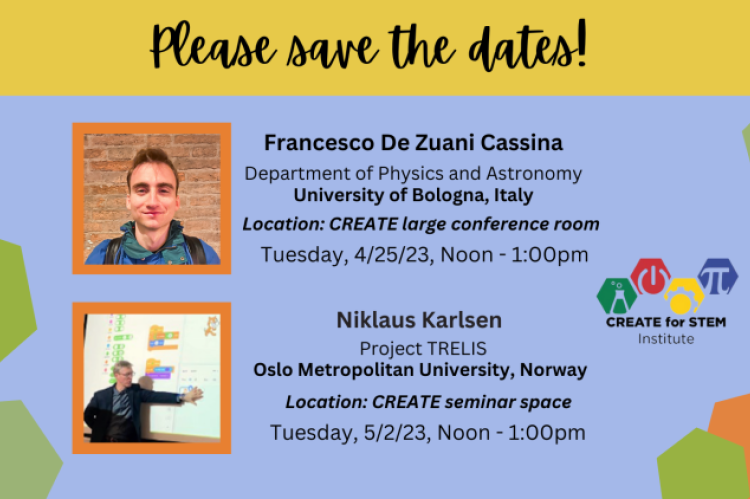Don't miss two upcoming Visiting Scholar presentations!
We are so excited to have two visiting scholars with us, Francesco De Zuani Cassina from Italy, and Niklas Karlsen from Norway, and delighted that they will be presenting their research with us.
Please plan to join us on Tuesday, 4/25 and Monday, 5/1 in CREATE!
Tuesday, 4/25/23, at noon, Francesco De Zuani Cassina will be presenting his work on his global PhD research, which aims to explore the connections between physics learning and students’ personal identity development. His approach is grounded upon the tradition of Bologna research group: focusing on disciplinary reconstruction of physics contents, exploiting the richness of its complexity, to develop interdisciplinary activities where the physics language is enhanced in its relevance and meaning by the intertwining with different (artistic) languages. The general research project – H2020 FEDORA Project- where his research is framed, will be presented and discussed. The Italian context of Science Education research and Teacher Education will be described as well.
**** This presentation will be held in the large conference room in CREATE!
Monday, 5/1/23, at noon, Niklas Karlsen will be presenting "Preparing pre-service teachers to use programming with modeling in science education".
Abstract: Programming and modeling have become an integral part of how modern science is done. This is also reflected in reforms of school curricula in different countries, for example Norway. There is however still not much research exploring how to prepare pre-service teachers (PSTs) for the task of using programming to teach science to students. In my PhD-project I use a designed-based research approach to develop a learning sequence for PSTs on creating simulations with the aid of programming and modeling. To scaffold the PSTs, we apply the use-modify-create approach (UMC) by Lee et al. (2011) to introduce the PSTs to examples of simulations in the popular block-based programming environment Scratch, which they then modify, and use as inspiration to create their own simulations. We use the TPACK-framework (Mishra & Koehler, 2006) to analyze the PSTs progress while they work with the simulations and create proposals for lesson plans related to the simulations they develop.
This work has been done with two different PST groups, while they were in their fourth year of study in a five-year Norwegian teacher preparation program. In this presentation I will give examples of the design of the learning sequence, and present preliminary results related to the progress the PSTs have shown in their understandings of how to use programming with simulations in science education. Analysis indicate that the PSTs develop better understandings of programming in Scratch, computational thinking, how to implement models of natural-science phenomena in Scratch, and how programming and simulations can be used with students to promote better understandings of natural-science phenomena. Two crucial design elements for the development of TPACK have been the UMC-approach and the lesson design task.
**** This presentation will be held in the CREATE seminar space!


